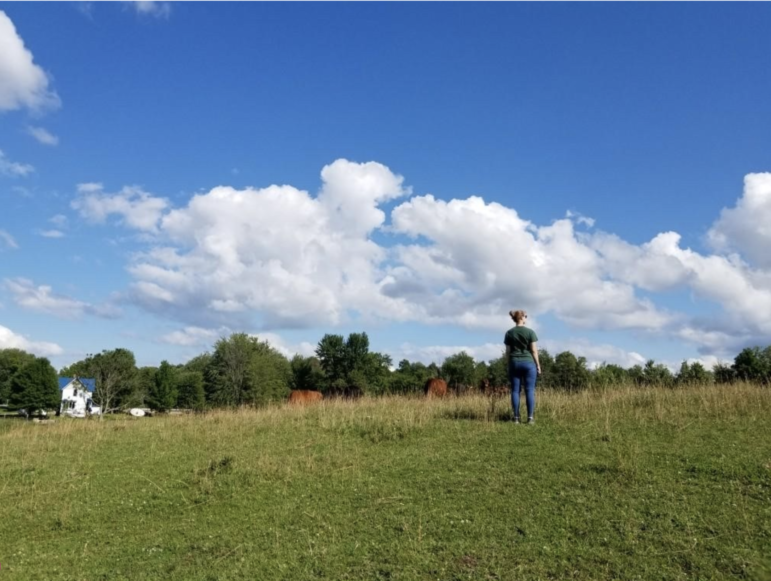By EMILE RIZK
Capital News Service
LANSING – In a move to reduce farmer suicides, a new program will train “guardians” in Ontario to recognize suicidal tendencies and mental illnesses, according to the Canadian Mental Health Association.
The voluntary program will train people who work closely with farmers, such as seed providers and veterinarians, to have conversations with distressed farmers and provide them with access to the proper resources to help understand those emotions, the association said in a statement.
Farmer suicide rates are not a problem exclusive to Ontario, however.
“We hear a lot about work-life balance. You and I go to work and, at the end of the day, leave the office and go home,” said health psychologist Remington Rice, the farm stress lead at Michigan State University Extension and a fifth-generation farmer in Benzonia.
“But farmers, when they are home, they look out the window and see the chores,” Rice said.

Remington Rice
Aly Rudy stands in a field overlooking the Rice Centennial Farm in Benzonia, assessing much of the work she has to do that day.A wide variety of factors impact farmers’ mental health. Many derive from factors in their work environment that are uncontrollable, Rice said.
Said Rice, “You and myself are going to collect a check at the end of the week (but) farmers are not necessarily guaranteed (regular pay). They have this ebb and flow that creates instability, and a lot of that instability is caused by factors that the farmer has no control over, whatsoever.”
Signs of farmer suicidal tendencies include ideation, planning, mood swings and bouts of depression that vary from an individual’s normal behavior, according to research on factors associated with suicidal behaviors in farmers.
According to the Guardian Network’s website, 68% of Ontario farmers are at risk of chronic stress levels, which can lead to both physical and mental illnesses. Furthermore, 35% of farmers meet the criteria to be classified as having depression.
Bethany Parkinson, the psychological support coordinator and trainer for the Toronto-based Guardian Network, said the idea for the program sparked from a University of Guelph study in 2015-16 looking at mental health.
Parkinson said the university did a follow-up study, published in 2021, showing that “one in four farmers felt their life was not worth living.”
The network was developed by groups that include psychologists, government representatives and officials, suicide preventionalists and mental health clinicians.
Parkinson said, “It’s a really great program in the sense that it provides a lot of stigma reduction – stigma surrounding suicide ideation – as well as getting people thinking about their own lives and about the way that society generally thinks about suicide and suicide within the farming community as well.”
In one-day training programs, guardians will learn techniques to help them identify a potentially at-risk farmer.
These include recognizing the presence of suicidal thoughts or planning, and then initiating conversations with farmers who may be suicidal or in distress.
Guardians will also have access to additional support to periodically assess their own well-being.
An important note regarding guardians and the farmers they may identify as suicidal is that guardians’ names will remain confidential throughout the reporting process. Farmers will never know who a guardian is or which guardian reported them, according to the website.
Emile Rizk reports for Great Lakes Echo.